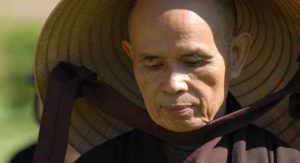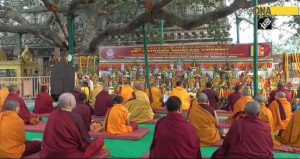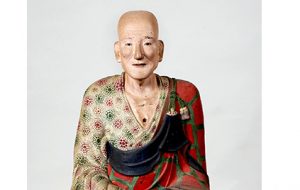
Those who have no intention of seeking faith in religion
Although people are said to be superior to animals and are capable of reasoning and engaging in abstract thought, many people pass through life without ever struggling with the meaning of existence. They care only about their own comfort and pleasure in the present, with little thought as to what will happen at the end of their lives.
Some people may attempt to attain worldly advantages such as peace and longevity by worshipping celestial bodies such as the sun, or imaginary supernatural powers or deities in the ethereal realms; but like atheists, they believe that the afterlife is unimportant or doesn’t exist at all. Regrettably, they also have no intention of ending their suffering by liberating themselves from the endless cycle of rebirth. If they are advised to aspire to rebirth in the Land of Bliss, such people are likely to turn away and reject Amitabha’s deliverance. Attempting to introduce them to the Buddha Dharma, or any religious teachings about the afterlife, at an inappropriate time can be counterproductive, or even harmful to their future spiritual development.
However, there are people who may be curious about the reality of the universe and the meaning of life. They may seek out teachings about the afterlife and the truth of existence as presented by various religions. They may begin to awaken to enlightenment, seek liberation, and end their worldly sufferings, including sickness, aging, and even death.
Ordinary beings seek faith in religion
Many people hesitate in selecting a religion, unable to differentiate between genuine and non-genuine. Fearing manipulation, they shun the “hard sell” and pressure tactics used by some religious devotees in converting others. Of course, this is appropriate, as embracing religious belief is a personal choice that should be made freely and without coercion. However, it is also a fact that the initial stages of faith in a religion take place in the midst of our own delusive thinking. This can prevent us from allowing the “life force” of religion to challenge and shape our values, emotional responses, and actions as we seek to make the teaching conform to our preconceived ideas.
In this way, we may unconsciously screen or filter out religious teachings that differ from our pre-existing ideas; we may even reject them outright if they do not fit into our preconceived metaphysical framework. Thus, seeking faith through interpretation based on our views and limited knowledge and experience is a flawed and futile exercise that leaves people vulnerable to the winds of false interpretation and non-Buddhist teachings.
In Buddhism, it is said that ordinary beings suffer from the Six Kinds of Basic Affliction,* including the Five Kinds of Wrong Views.** So by basing religious belief on personal interpretation—facilitated by a delusive mind, limited knowledge, and subjective experience—how can a person know whether a religious leader, his teachings, or the institution can be trusted? We should note that personal belief vacillates and is subject to change, so it is not real, permanent, pure, or virtuous. We can only experience certainty in religious endeavors if we set aside unsound beliefs based on personal interpretation and instead cultivate faith in the Buddha and his teachings.
Definition of faith
In Buddhism, faith is defined in the Doctrine of Mere Consciousness, compiled and written in the 7th century by the eminent master Xuanzang, as follows: “With respect to reality, virtue, and capacity, there is a kind of deep faith that one has delight in pursuing. The nature of this faith is purification of the mind.” What does this concise definition mean?
If we take into consideration the qualities of a religious founder, faith can be understood in the following way: If a person says, “I have faith in Shakyamuni Buddha,” he must believe that the Buddha is a real person, possessing the virtues of wisdom and morality. He must also believe the Buddha to be so powerful that he is capable of relieving suffering and bestowing joy and peace. His confidence in the Buddha is like that of a patient in his doctor, or a student in his teacher. The devotee is delighted to pursue deep faith in Shakyamuni Buddha because he believes the Buddha can lead him to the ultimate state of purity: with no delusion, no attachment, and total freedom from any obstruction. That is the reason this kind of belief is called “faith.”
The six requirements of a genuine religious founder
As far as religion is concerned, since we cannot call on personal experience, belief in an afterlife is the intellectual component of studying and accepting a religious teaching. Such knowledge is learned through a sage’s words, a “testimony worthy of confidence,” such as that of Shakyamuni Buddha in Buddhism or Jesus Christ in Christianity.
Among all the religious founders in the world, who should we believe in? This is the main question for all seekers of religion. Master Hsing Yun, a contemporary master from Taiwan, lists six criteria for accepting the teachings of a religious figure:
1. He must be real. He must be a historical person, not legendary or non-existent.
2. He must be virtuous. He must be perfect in virtue; so compassionate that his love is unconditional; unselfish, able to treat all living beings as equal.
3. He must be capable. He must be an enlightened one who can enlighten others; a great teacher leading beings to ultimate liberation and happiness; a great doctor curing all the diseases of sentient beings.
4. He must be pure in observing the precepts. He must be strict in upholding the precepts, a role model for his devotees in thought, speech, and action.
5. His teachings must be complete. They are comprehensive and unbiased; applicable to any time and any place; not conflicting or contradictory, leading us to ultimate purity and freedom, with no obstruction and no attachment.
6. His wisdom must be unsurpassed. He must be fully and perfectly enlightened; his wisdom must be infinite and boundless, eternal and pure.
I believe that Shakyamuni Buddha is the only religious founder to satisfy all these requirements, and thus the only one to whom we can entrust ourselves without doubt or hesitation.
* The Six Kinds of Basic Affliction: 1. Greed, 2. Hatred, 3. Delusion, 4. Arrogance, 5. Suspicion, 6. Wrong Views.
** The Five Kinds of Wrong Views: 1. Selfish view, 2. Extreme view, 3. Perverse view, 4. Stubborn, perverted view, and 5. Rigid views in favor of rigorous ascetic prohibitions











